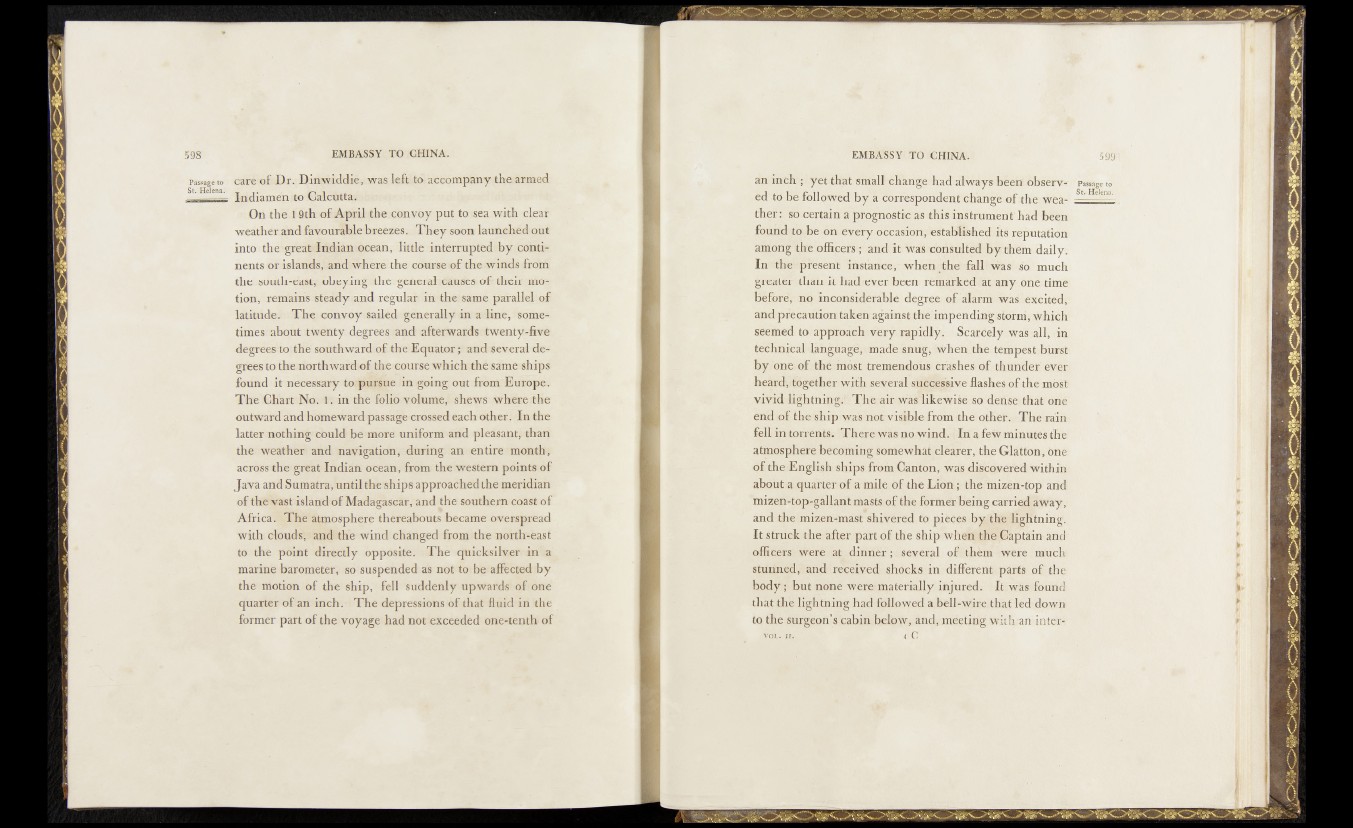
carèofDr. Dinwiddie, was left to accompany thearrned
ladianrinito Cyetttaswfi:
On the J 9th of April the. convoy put to »sea with cleat
weather and favourakdebreezes. They soon launched out
into the‘greatelndian .ocean, little interruptedby continents
or islands, andswhere the eourseof the winds from
the scmth-east# obeying the generafïMïiSes oft their motion,
remains steady and regular in the same parallel'd E
latitude. The convoy sailed generally in a line, some-1
times about twenty degreesvand afterwards twenty-five
degrees to the southward of the Equator; and several cfe-
grees to the nor th wattfenf the course which thé saméssbips
found it necessary to. pursue in going out from Europe.
The Chart No. 1. in the folio volume, shews where the
outward and homeward passage crossed each other. In the
latter nothing could be more uniform and pleasant, than
the weather and navigation,-during an entire month;
across the great Indian ocean, from the western points of
Java and Sumatra, until theships approached the meridian
of the vast island of Madagascar, and the southern coast of
AfricaSJ The atmosphere thereabouts became overspread
with clouds, and the wind changed drom the nortfoèaèt
to the point directly opposite. The quicksilver in a
marine barometer, so suspended as not to be affected by
the motion of the ship, fell suddenly upwards oft one
quarter of an inch:* The depressions of that fluid in the
former part of the voyage had not exceeded one-tenth of
an inch'; yet that sikalf clAtfl^had.always bterf- observ- Passage to
ed to be folIdsVed b yaxojrespondeitt'. ;the: weatheir:
so.certain'a prognostics4his instrument had been
found to-fte on every oecashin^establlsheddts reputation
among th e officers*’; audits wa's-nonsulted b y them daily*.
In the" preseUe thstance.,’ when jlhes falli was so. much
greater "than it hadreVer been remarked at any .one-time
before',- nq inconsiderable i degreer/ef alarm* .wasrsexcitedb
and precaution taken against. ths@?impendi®grsfofm;-which
seemed toiapproach very r a p id ly ; Se^elyftwa-s all; in
tetfhnicafdangnag%tm ade snug,iwljeh.. the tempest hutst
by onUseftthe most trenreBdesus* crashes of, thurafler. ever
heard,'together with several sj?tte^sive flashes^qf the most*
vivid lightraffig^The air was*likewise so dense that onfi
end ©F. tfeishi-pTwas-nofcyisfble from the other.- The rain
fell in torrent® Therewasnq.wind-. In afew minutes the
atmospherehecoming somewhat clearer, the Glatton, one*
of the?Emglish ships from Canton, was discovered within
about sa,quarter of a mile of the Lion ; the mizeri-fop and!
'mizen-top-gallant masts of the former being carried away,
and the mizen-mast shivered to pieces bythfeJigHtnirigf.,
It struck the after part of the ship when, the Captain and'
officers'were at dinner several of them Wbre/much
stuifn^cft and*“ received shocks in different* parts of the
body ;■ but none were materially injured. It.,w,asfound
that the lightning had followed a bell-wire.that led dqwn
to the surgeon’s cabin below, and,-.meeting with ’an inter